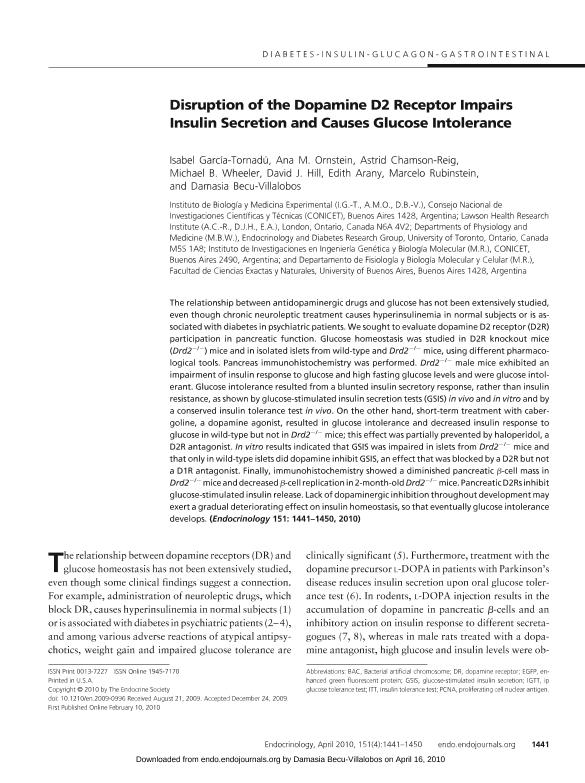Mostrar el registro sencillo del ítem
dc.contributor.author
Garcia Tornadu, Isabel Andrea

dc.contributor.author
Ornstein, Ana Maria

dc.contributor.author
Chamson Reig, Astrid
dc.contributor.author
Wheeler, Michael B.
dc.contributor.author
Hill, David J.
dc.contributor.author
Arany, Edith
dc.contributor.author
Rubinstein, Marcelo

dc.contributor.author
Becu, Damasia

dc.date.available
2017-04-03T14:28:03Z
dc.date.issued
2010-04
dc.identifier.citation
Garcia Tornadu, Isabel Andrea; Ornstein, Ana Maria; Chamson Reig, Astrid; Wheeler, Michael B.; Hill, David J.; et al.; Disruption of the dopamine D2 receptor impairs insulin secretion and causes glucose intolerance; Oxford University Press; Endocrinology; 151; 4; 4-2010; 1441-1450
dc.identifier.issn
0013-7227
dc.identifier.uri
http://hdl.handle.net/11336/14664
dc.description.abstract
The relationship between antidopaminergic drugs and glucose has not been extensively studied, even though chronic neuroleptic treatment causes hyperinsulinemia in normal subjects or is associated with diabetes in psychiatric patients. We sought to evaluate dopamine D2 receptor (D2R) participation in pancreatic function. Glucose homeostasis was studied in D2R knockout mice (Drd2(-/-)) mice and in isolated islets from wild-type and Drd2(-/-) mice, using different pharmacological tools. Pancreas immunohistochemistry was performed. Drd2(-/-) male mice exhibited an impairment of insulin response to glucose and high fasting glucose levels and were glucose intolerant. Glucose intolerance resulted from a blunted insulin secretory response, rather than insulin resistance, as shown by glucose-stimulated insulin secretion tests (GSIS) in vivo and in vitro and by a conserved insulin tolerance test in vivo. On the other hand, short-term treatment with cabergoline, a dopamine agonist, resulted in glucose intolerance and decreased insulin response to glucose in wild-type but not in Drd2(-/-) mice; this effect was partially prevented by haloperidol, a D2R antagonist. In vitro results indicated that GSIS was impaired in islets from Drd2(-/-) mice and that only in wild-type islets did dopamine inhibit GSIS, an effect that was blocked by a D2R but not a D1R antagonist. Finally, immunohistochemistry showed a diminished pancreatic beta-cell mass in Drd2(-/-) mice and decreased beta-cell replication in 2-month-old Drd2(-/-) mice. Pancreatic D2Rs inhibit glucose-stimulated insulin release. Lack of dopaminergic inhibition throughout development may exert a gradual deteriorating effect on insulin homeostasis, so that eventually glucose intolerance develops
dc.format
application/pdf
dc.language.iso
eng
dc.publisher
Oxford University Press

dc.rights
info:eu-repo/semantics/openAccess
dc.rights.uri
https://creativecommons.org/licenses/by-nc-nd/2.5/ar/
dc.subject
Dopamine
dc.subject
Insulin
dc.subject
Glucose
dc.subject
D2
dc.subject
Diabetes
dc.subject.classification
Otras Ciencias Médicas

dc.subject.classification
Otras Ciencias Médicas

dc.subject.classification
CIENCIAS MÉDICAS Y DE LA SALUD

dc.subject.classification
Otras Medicina Básica

dc.subject.classification
Medicina Básica

dc.subject.classification
CIENCIAS MÉDICAS Y DE LA SALUD

dc.title
Disruption of the dopamine D2 receptor impairs insulin secretion and causes glucose intolerance
dc.type
info:eu-repo/semantics/article
dc.type
info:ar-repo/semantics/artículo
dc.type
info:eu-repo/semantics/publishedVersion
dc.date.updated
2017-03-27T15:54:36Z
dc.identifier.eissn
1945-7170
dc.journal.volume
151
dc.journal.number
4
dc.journal.pagination
1441-1450
dc.journal.pais
Reino Unido

dc.journal.ciudad
Oxford
dc.description.fil
Fil: Garcia Tornadu, Isabel Andrea. Consejo Nacional de Investigaciones Científicas y Técnicas. Instituto de Biología y Medicina Experimental (i); Argentina; Argentina
dc.description.fil
Fil: Ornstein, Ana Maria. Consejo Nacional de Investigaciones Científicas y Técnicas. Instituto de Biología y Medicina Experimental (i); Argentina; Argentina
dc.description.fil
Fil: Chamson Reig, Astrid. Lawson Health Research Institute; Canadá
dc.description.fil
Fil: Wheeler, Michael B.. University of Toronto. Departments of Physiology and Medicine ; Canadá
dc.description.fil
Fil: Hill, David J.. Lawson Health Research Institute; Canadá
dc.description.fil
Fil: Arany, Edith. Lawson Health Research Institute; Canadá
dc.description.fil
Fil: Rubinstein, Marcelo. Consejo Nacional de Investigaciones Científicas y Técnicas. Instituto de Investigaciones en Ingeniería Genética y Biología Molecular; Argentina. Universidad de Buenos Aires. Facultad de Ciencias Exactas y Naturales. Departamento de Fisiologia, Biologia Molecular y Celular. Laboratorio de Fisiologia y Biologia Molecular; Argentina
dc.description.fil
Fil: Becu, Damasia. Consejo Nacional de Investigaciones Científicas y Técnicas. Instituto de Biología y Medicina Experimental (i); Argentina; Argentina
dc.journal.title
Endocrinology

dc.relation.alternativeid
info:eu-repo/semantics/altIdentifier/url/https://academic.oup.com/endo/article-lookup/doi/10.1210/en.2009-0996
dc.relation.alternativeid
info:eu-repo/semantics/altIdentifier/doi/http://dx.doi.org/10.1210/en.2009-0996
Archivos asociados
